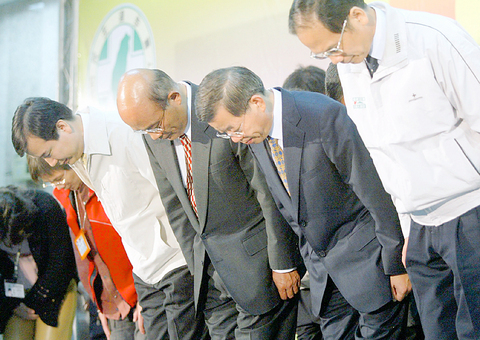The Chinese Nationalist Party (KMT) won a resounding victory over the Democratic Progressive Party (DPP) in yesterday's local government elections, in a win attributed to voter unhappiness with the DPP's poor performance and entanglement in recent scandals.
The KMT won 14 out of 23 city and county constituencies, while the DPP -- which previously controlled 9 counties and cities -- won just six seats.
Among the constituencies that changed hands from the DPP to the KMT were the traditional pan-green strongholds of Taipei and Ilan Counties. The DPP also lost Chiayi City, long an anti-KMT sanctuary during the days of Martial Law and the dangwai democracy movement.

PHOTO: LIN CHIN-CHI, TAIPEI TIMES
"This is not a triumph for the KMT but for the Taiwanese people," KMT Chairman Ma Ying-jeou (馬英九) said in a victory speech last night. "The DPP was not defeated by the KMT, but by itself."
Ma had said that he would resign if his party failed to get at least 11 candidates elected in the commissioner and mayoral polls.
Yesterday's vote was called a "three-in-one" election because it combined county commissioner and city mayor elections, county and city councilor elections and township chief elections.

PHOTO: LIN CHENG-KUN, TAIPEI TIMES
Although yesterday's elections were local government polls, the ruling and opposition parties considered the results crucial to gaining momentum ahead of the 2008 presidential election, raising the stakes in the contest.
In two key races, the Democratic Progressive Party's (DPP) Luo Wen-chia (
Relentless attacks
Although the KMT has often been criticized for its poor campaign strategy, analysts attributed the party's success to its relentless criticism of the government's poor record and tenacious pursuit of a recent string of scandals, including the Kaohsiung Rapid Transit Corp (KRTC) scandal and the "vultures" insider-trading case.
DPP Chairman Su Tseng-chang (蘇貞昌), who said that he would resign as chairman if Luo lost in Taipei County, or if the party failed to win at least 10 seats in the commissioner and mayoral polls, offered to resign last night.
Su said that his party accepted the election results, and he called on the public to continue to have faith in the DPP.
"The DPP has lost one election, but Taiwan cannot lose," Su said.
To express their regret over the defeat and accept responsibility for the outcome, Su, Presidential Office Secretary-General Yu Shyi-kun and Premier Frank Hsieh (謝長廷) bowed to the public three times.
66 percent turnout
The DPP garnered about 3.7 million votes -- around 42 percent of the total, while the KMT received 4.5 million votes, or about 51 percent. The Central Election Commission estimated the turnout to be approximately 66 percent of registered voters.
The DPP held on to its southern strongholds of Pingtung County, Tainan City and county and Kaohsiung County, while the KMT took control in northern, central and eastern Taiwan.
Three remote counties on outlying islands remained loyal to the pan-blue camp, with Penghu, Kinmen County and Lienchiang County -- the official administrative title for the Matsu archipelago -- all firmly controlled by the pan-blue alliance. Kinmen County went to the New Party, while Lienchiang County went to the PFP and Penghu went to the KMT.
The People First Party (PFP) captured one district, while the Taiwan Solidarity Union (TSU) came out of yesterday's vote empty-handed.
Blue north
In northern Taiwan, the KMT seized control in six districts, including Taipei, Taoyuan, Hsinchu and Miaoli counties as well as Hsinchu and Keelung Cities. The DPP captured none.
In central Taiwan, the KMT obtained six seats in Taichung, Changhua and Nantou counties and Taichung and Chiayi cities. The DPP captured Yunlin County and held on to Chiayi County.
Eastern Taiwan, which has long been controlled by the KMT, remained a pan-blue stronghold.
Hualien County went to the KMT, while a scandal-plagued former KMT member also won in Taitung County as an independent candidate.
Taitung Council Speaker Wu Chun-li (吳俊立) defeated two independent candidates to hold on to his seat. Wu, however, may be suspended from his post in accordance with the Law on Local Government Systems (地方制度法).
He was convicted of corruption by the High Court but has appealed the ruling. He has also been charged with vote-buying but is out on NT$1 million (US$29,800) bail.

DAREDEVIL: Honnold said it had always been a dream of his to climb Taipei 101, while a Netflix producer said the skyscraper was ‘a real icon of this country’ US climber Alex Honnold yesterday took on Taiwan’s tallest building, becoming the first person to scale Taipei 101 without a rope, harness or safety net. Hundreds of spectators gathered at the base of the 101-story skyscraper to watch Honnold, 40, embark on his daredevil feat, which was also broadcast live on Netflix. Dressed in a red T-shirt and yellow custom-made climbing shoes, Honnold swiftly moved up the southeast face of the glass and steel building. At one point, he stepped onto a platform midway up to wave down at fans and onlookers who were taking photos. People watching from inside

A Vietnamese migrant worker yesterday won NT$12 million (US$379,627) on a Lunar New Year scratch card in Kaohsiung as part of Taiwan Lottery Co’s (台灣彩券) “NT$12 Million Grand Fortune” (1200萬大吉利) game. The man was the first top-prize winner of the new game launched on Jan. 6 to mark the Lunar New Year. Three Vietnamese migrant workers visited a Taiwan Lottery shop on Xinyue Street in Kaohsiung’s Gangshan District (崗山), a store representative said. The player bought multiple tickets and, after winning nothing, held the final lottery ticket in one hand and rubbed the store’s statue of the Maitreya Buddha’s belly with the other,

‘NATO-PLUS’: ‘Our strategic partners in the Indo-Pacific are facing increasing aggression by the Chinese Communist Party,’ US Representative Rob Wittman said The US House of Representatives on Monday released its version of the Consolidated Appropriations Act, which includes US$1.15 billion to support security cooperation with Taiwan. The omnibus act, covering US$1.2 trillion of spending, allocates US$1 billion for the Taiwan Security Cooperation Initiative, as well as US$150 million for the replacement of defense articles and reimbursement of defense services provided to Taiwan. The fund allocations were based on the US National Defense Authorization Act for fiscal 2026 that was passed by the US Congress last month and authorized up to US$1 billion to the US Defense Security Cooperation Agency in support of the

HIGH-TECH DEAL: Chipmakers that expand in the US would be able to import up to 2.5 times their new capacity with no extra tariffs during an approved construction period Taiwan aims to build a “democratic” high-tech supply chain with the US and form a strategic artificial intelligence (AI) partnership under the new tariffs deal it sealed with Washington last week, Taipei’s top negotiator in the talks said yesterday. US President Donald Trump has pushed Taiwan, a major producer of semiconductors which runs a large trade surplus with the US, to invest more in the US, specifically in chips that power AI. Under the terms of the long-negotiated deal, chipmakers such as Taiwan Semiconductor Manufacturing Co (TSMC, 台積電) that expand US production would incur a lower tariff on semiconductors or related manufacturing